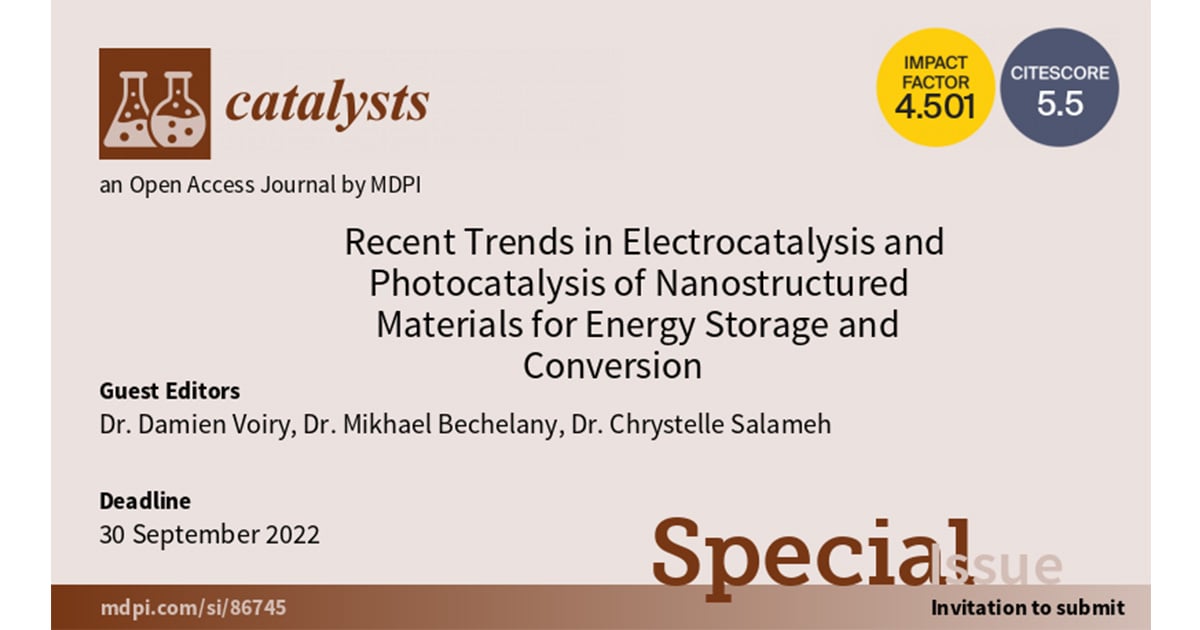- 4.0Impact Factor
- 7.6CiteScore
- 17 daysTime to First Decision
Recent Trends in Electrocatalysis and Photocatalysis of Nanostructured Materials for Energy Storage and Conversion
This special issue belongs to the section “Catalytic Materials“.
Special Issue Information
Dear Colleagues,
In the context of climate change and population growth, energy storage and conversion are a major challenge we have to face toward a global low-carbon ecosystem. Catalysis, via photocatalysis and electrocatalysis, is an efficient way to convert chemicals and energy into diverse and value-added forms. The development of new materials, in particular nanostructured materials with specific properties, is crucial to enable high conversion efficiencies and improved energy density. Nanomaterials are a very important class of materials for photocatalysis and electrocatalysis due to their high surface-to-volume ratio and short migration distances.
The aim of this Special Issue is to collect the latest contributions in the rational design and synthesis of electrocatalytic and photocatalytic nanomaterials in the field of energy conversion and storage. Examples include but are not limited to CO2 reduction, water splitting, N2 fixation, electrode and electrolyte materials for batteries and supercapacitors, solid-state hydrogen storage, solar cells, heterogeneous catalysts, semiconductors, and plasmonics.
It is our pleasure to invite you to submit a manuscript to this Special Issue. Full research papers, communications, and reviews are all welcome.
Dr. Chrystelle Salameh
Dr. Damien Voiry
Dr. Mikhael Bechelany
Guest Editors
Manuscript Submission Information
Manuscripts should be submitted online at www.mdpi.com by registering and logging in to this website. Once you are registered, click here to go to the submission form. Manuscripts can be submitted until the deadline. All submissions that pass pre-check are peer-reviewed. Accepted papers will be published continuously in the journal (as soon as accepted) and will be listed together on the special issue website. Research articles, review articles as well as short communications are invited. For planned papers, a title and short abstract (about 250 words) can be sent to the Editorial Office for assessment.
Submitted manuscripts should not have been published previously, nor be under consideration for publication elsewhere (except conference proceedings papers). All manuscripts are thoroughly refereed through a single-blind peer-review process. A guide for authors and other relevant information for submission of manuscripts is available on the Instructions for Authors page. Catalysts is an international peer-reviewed open access monthly journal published by MDPI.
Please visit the Instructions for Authors page before submitting a manuscript. The Article Processing Charge (APC) for publication in this open access journal is 2200 CHF (Swiss Francs). Submitted papers should be well formatted and use good English. Authors may use MDPI's English editing service prior to publication or during author revisions.
Keywords
- Electrocatalysis
- Photocatalysis
- Nanomaterials
- Energy storage
- Energy conversion

Benefits of Publishing in a Special Issue
- Ease of navigation: Grouping papers by topic helps scholars navigate broad scope journals more efficiently.
- Greater discoverability: Special Issues support the reach and impact of scientific research. Articles in Special Issues are more discoverable and cited more frequently.
- Expansion of research network: Special Issues facilitate connections among authors, fostering scientific collaborations.
- External promotion: Articles in Special Issues are often promoted through the journal's social media, increasing their visibility.
- e-Book format: Special Issues with more than 10 articles can be published as dedicated e-books, ensuring wide and rapid dissemination.

